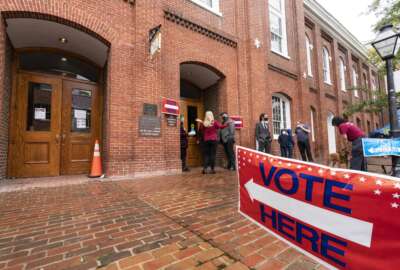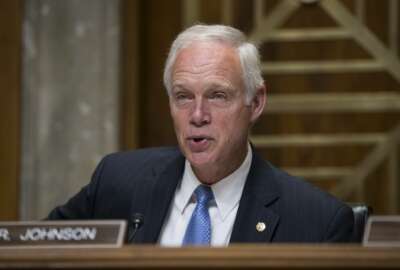
Federal employees can now take paid leave to vote and work at the polls
In today's Federal Newscast: Federal agency CIOs are finalizing plans to create and fund a zero-trust architecture. A former head of the TSA has died. And you can...
- Federal employees can have up to eight hours of paid administrative leave on election days. The Office of Personnel Management is implementing President Joe Biden’s executive order from March 2021 by letting employees take up to four hours of paid administrative leave to vote in federal, state, local and tribal elections. OPM also said employees can have four more hours of paid administrative leave to act as non-partisan poll workers or observers.
- Laws and directives surrounding the fate of LGBTQ+ and specifically transgender children are on the rise. The Department of the Air Force is taking a rare step to ensure they have the resources they need. The Air and Space Forces involuntarily send troops to bases where new laws prohibit transgender children from getting medical assistance or playing in sports. Other laws don’t allow schools to officially talk about sexual orientation. The Department of the Air Force is reaching out to its service members to make them aware the military has resources for dealing with local laws. The services are encouraging families to go to military medical clinics for health questions and to contact the Military Exceptional Family Member program for legal questions. (Federal News Network)
- The Marine Corps is updating some of its uniform policies by allowing black socks, slightly longer hair, and ombre nail polish in combat uniforms. Ombre nails are a type of layered manicure that blends different colors. The Marine Corps said the changes will positively impact diversity and inclusion.
- Monday is a big deadline for agencies and their move to zero trust. Federal agency chief information officers are finalizing plans to create and fund a zero trust architecture. These plans are due to the Office of Management and Budget and the Cybersecurity and Infrastructure Security Agency by Monday. OMB gave agencies 60 days starting in January to develop implementation plans for fiscal 2022 through 2024, as well as budget estimates for 2023 and 2024. The plans must detail how agencies will, for example, use a centralized identity management system that can be integrated into applications and common platforms. In all, there are 10 specific areas the implementation plans must address.
- Two parts of a House bill on employee retirement will affect some participants in the Thrift Savings Plan. The legislation would increase the age that TSP participants can start receiving their mandatory retirement benefits. Along with that change, the bill also requires all catch-up contributions to the TSP to be Roth contributions. The Securing a Strong Retirement Act of 2021 is slated to move to the House floor next week.
- Rep. Ted Budd (R-N.C.) introduced legislation that would prohibit the Thrift Savings Plan from making investments in Russia. Budd is sponsoring the Terminating Securities from Putin Act. The Federal Retirement Thrift Investment Board, which is in charge of the TSP, which has over 6 million participants in the federal workforce, said it analyzed its investments in response to the legislation and concluded that no TSP funds contain Russian investments.
- The IRS is bringing more employees back to the office as part of a phased reentry plan. The National Treasury Employees Union said the IRS is planning to bring bargaining unit employees back to the office in two phases, one on May 8, the other on June 25. The office reentry plan will bring additional employees back to more than 600 facilities across the country. NTEU President Tony Reardon said both parties reached an agreement regarding the agency’s decision to end its maximum telework policy. Reardon also said that NTEU’s national contract that went into effect last year ensures telework opportunities will remain in place. (Federal News Network)
- The Postal Service is doubling its initial order for electric vehicles under its next-generation fleet contract. USPS said it spent nearly $3 billion to buy 50,000 next-generation vehicles as part of its first order from Oshkosh Defense. As part of that initial order, more than 10,000 of those vehicles are electric vehicles. Congress and the White House though have criticized the agency’s plans for falling short of the Biden administration’s expectations. (Federal News Network)
- Agencies will soon get new guidance for buying secure software. The White House Office of Management and Budget will release secure software guidance within the next three months. The Department of Homeland Security is also developing new contract language to ensure security requirements are met. Federal Chief Information Security Officer Chris DeRusha said it’s about incentivizing companies to adopt secure development processes. “That means a culture change in agencies and means a culture change in some of the vendor organizations themselves,” DeRusha said. (Federal News Network)
- The General Services Administration is setting a higher bar to do more business with small, disadvantaged businesses. GSA said it will more than quadruple its target for spending on contracts that go to small, disadvantaged businesses this fiscal year. GSA is setting the spending target at 21% for fiscal 2022. The agency exceeded that target in fiscal 2020, when more than 22% of its contracts went to small, disadvantaged businesses.
- Former Transportation Security Administration head Edmund “Kip” Hawley died earlier this week. The cause of death was not disclosed. In the wake of Sept. 11, 2001, Hawley was senior adviser to the project team that established TSA. He served on the Federal Aviation Administration’s Air Traffic Services Committee before becoming TSA administrator in 2005. Hawley led TSA through the end of the Bush administration. More recently, he advocated for improved pay for front-line Transportation Security Officers. Hawley was 68 years old.
Copyright © 2025 Federal News Network. All rights reserved. This website is not intended for users located within the European Economic Area.
Peter Musurlian
Peter Musurlian is a producer at Federal News Network.
Follow @PMusurlianWFED
Related Stories
Related Topics
All News
Benefits
Chris DeRusha
Cybersecurity and Infrastructure Security Agency
Department of Homeland Security
diversity equity inclusion and accessibility
Edmund Hawley
electric vehicles
environmental sustainability
Federal Drive
Federal Newscast
General Services Administration
LGBT
Management
Marine Corps
military families
National Treasury Employees Union
Office of Management and Budget
Office of Personnel Management
office reentry
paid leave
Pay & Benefits
Postal Service
reentry
Russia
small business
Thrift Savings Plan
Tom Temin
Tony Reardon
transgender
Transportation Security Administration
Transportation Security Officers
voter registration
voter turnout
voting infrastructure
Voting Rights Act
Workforce
Workforce Rights/Governance
zero trust
zero trust strategy




